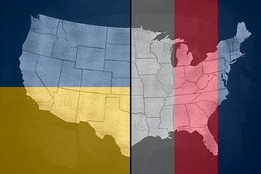-
Definition
-
Definition
-
Did you know?
-
Synonyms
-
Example Sentences
-
Word History
-
Related Articles
-
Podcast
-
Entries Near
-
- To save this word, you'll need to log in.
patriot
noun

 W. R. Hearst, Jr.
W. R. Hearst, Jr.Did you know?
More on the Meaning of Patriot
The word patriot signifies a person who loves their country and is ready to boldly support and defend it. That meaning has endured since the word's arrival in English in the 16th century, but it has not marched through the years unchallenged.
Ultimately derived from Greek patrios, meaning "of one’s father," patriot entered English via French patriote—meaning "fellow countryman" or "compatriot"—during a time of political unrest in western Europe that was characterized by infighting among fellow countrymen—especially among those of the Protestant and Catholic faiths.
For much of the 17th century, words like good were attached to patriot to distinguish patriots who shared both a love of country and a common allegiance from those having opposing beliefs and loyalties: to be deemed a "good patriot" was to be a lover of country who agreed on political and/or religious matters with whoever was doing the deeming.
The Catholiques were knowne good Patriots under our former Kings.
— Henry Hammond, A view of some exceptions which have been made by a Romanist to the Lord Viscount Falkland's discourse…, 1646
Patriot was used to mean "good patriot" without modification more frequently by the end of the 17th century, but it tended to apply to a supporter of the ruling monarchy.
A Patriot, both the King and Country serves; Prerogative, and Privilege preserves.
— John Dryden, Fables, Ancient and Modern, 1700
Another effect of the tumultuous times was the development of a derogatory use of patriot to refer to hypocritical patriots: people who claimed devotion to one's country and government but whose actions or beliefs belied such devotion. This ultimately led to the discrediting of the loyalty and steadfastness associated with the word patriot.
The years leading up to the American Revolutionary War further propagated the notion of patriot as a name for a seditious rebel against the monarchy. American writers of the 18th century, however, heartily embraced the word to define the colonists who took action against British control. As tensions continued to escalate, a new meaning of patriot came to the forefront, referring to a person who advocates or promotes the independence of their land or people from the country of which they are a colony. Benjamin Franklin provides an early record of this use.
It should be no Wonder … if among so many Thousand true Patriots as New England contains there should be found even Twelve Judases.
— Benjamin Franklin, letter, 7 July 1773
In the end, the patriots won the war and, centuries after America’s Declaration of Independence, patriot has held its place of honor in the English language as the meritorious name for the brave men and women of the armed forces who defend the rights and freedoms of their country. Stripped of all past disparagement, the word has returned to its original meaning: "one who loves his or her country."
Today, active fighting or resistance is not a requirement to being a patriot: a person only needs a strong sense of love for one’s country.
Examples of patriot in a Sentence
 Thomas Doherty, The Hollywood Reporter, 12 Oct. 2024
Allegiances are often cloaked in the vernacular of America’s founding patriots.
—
Thomas Doherty, The Hollywood Reporter, 12 Oct. 2024
Allegiances are often cloaked in the vernacular of America’s founding patriots.
— Jeffrey Fleishman, Los Angeles Times, 19 Sep. 2024
Meanwhile, nearly 3 in 10 Republicans believe that true American patriots may have to resort to violence to save the country, compared with 16% of independents and 8% of Democrats.
—
Jeffrey Fleishman, Los Angeles Times, 19 Sep. 2024
Meanwhile, nearly 3 in 10 Republicans believe that true American patriots may have to resort to violence to save the country, compared with 16% of independents and 8% of Democrats.
— Russell Contreras, Axios, 21 Oct. 2024
Since 2022, Putin has continued his practice of staging meetings with pleasant young patriots around the country: nuclear physicists, innovators, defense industry workers, entrepreneurs, students, and even schoolchildren.
—
Russell Contreras, Axios, 21 Oct. 2024
Since 2022, Putin has continued his practice of staging meetings with pleasant young patriots around the country: nuclear physicists, innovators, defense industry workers, entrepreneurs, students, and even schoolchildren.
— Andrei Kolesnikov, Foreign Affairs, 15 Oct. 2024
See all Example Sentences for patriot
Andrei Kolesnikov, Foreign Affairs, 15 Oct. 2024
See all Example Sentences for patriot 

Word History
Middle French patriote compatriot, from Late Latin patriota, from Greek patriōtēs, from patria lineage, from patr-, patēr father
1577, in the meaning defined above
Articles Related to patriot

New England vs. Los Angeles: A Battle...
East/west regionalisms: Super Bowl Edition

The Difference Between 'Patriotism' and...
Although treated as synonyms, there is a distinction. But it's more complicated than "'patriotism' good; 'nationalism' bad."

'Patriot' Hasn't Always Been Positive
The history of a word you'll need this holiday weekend
Podcast
Get Word of the Day delivered to your inbox!
Dictionary Entries Near patriot
Cite this Entry
“Patriot.” Merriam-Webster.com Dictionary, Merriam-Webster, https://www.merriam-webster.com/dictionary/patriot. Accessed 28 Nov. 2024.
Kids Definition
patriot
noun
More from Merriam-Webster on patriot
Nglish: Translation of patriot for Spanish Speakers
Britannica English: Translation of patriot for Arabic Speakers











Share